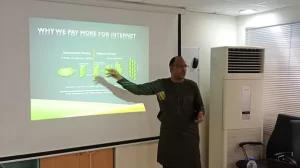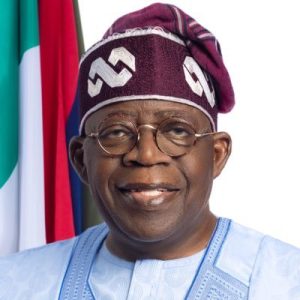South Africa’s MTN Group says it is engaging in talks in Nigeria on amending the Nigerian Communications Act (NCA) 2003 to enable further tariff increases by MTN Nigeria, its local subsidiary, and the nation’s largest mobile operator.
Ralph Mupita, MTN Group CEO, who dropped the hint, says that the Nigeria Communications Act 2003, the laws establishing the Nigerian Communications Commission (NCC), needs to change to facilitate the telecoms group’s interest towards gaining further telecoms tariff increase.
The MTN Group CEO, who dropped the hint about the legal reforms on Monday while briefing analysts at the MTN Group 2025 Interim Results event in Johannesburg, South Africa, also says that MTN Nigeria is on a drive to own the fibre-to-the-home (FTTH) market in the country.
MTN Nigeria accounted for 89,243,348 subscribers representing 52.03% share of the mobile phone market, followed by Airtel Nigeria, 58,965,827 (34.38%); Glo with 20,885,055 (12.18%) and T2 (formerly 9mobile) 2,436,993 (1.42%) as of mid-year 2025, according to market statistics by NCC.

According to him, “so we have discussed in Nigeria the need to be able to pass on inflation, we’ve got the 50%. The process of tariff increases in Nigeria is actually regulated and in the Act. So the Act has to change. The NCA Act has to change. But those dialogues are ongoing. And I guess when we make a development.”
MTN Nigeria, one of the beneficiaries of an industry-wide 50% tariff increase approved by NCC following prolonged agitation by industry players to cushion the effects of several economic factors including foreign exchange volatility, declining revenue and other socio-economic factors..
Beyond the January 2025 tariff increase approved by the NCC, the MTN Group CEO says that the telecoms group needs additional reforms to pave the way for price increase.
Responding to the question about passing on local price increase in Nigeria, Mupita says that: “I can’t say that, I’m not God. So, I think we have the continuing discussions with the authorities around inflation. So I think what you need to take into is the process we go through.”
According to him, “so we have discussed in Nigeria the need to be able to pass on inflation, we’ve got the 50%. The process of tariff increases in Nigeria is actually regulated and in the Act. So the Act has to change. The NCA Act has to change. But those dialogues are ongoing. And I guess when we make a development.”
He explains further that, “In Ghana, we’re already in a process multi years because of our SMP regulation. We are defined as dominant in Ghana. And therefore, we can’t push pricing down to enable the number two and number three to operate. And we’ve had sequential years of being able to pass on pricing quite effectively.”

NCA further says “the SMP classification is not intended to punish or stifle MTN’s operations but rather to ensure a level playing field in the market and protect consumer choice. When an operator attains a significant market share and dominance, it has the potential to impact competition negatively, resulting in higher prices, lower quality of service, and reduced innovation. The SMP designation allows the NCA to impose certain regulations and measures on MTN to prevent abuse of its market power and ensure fair competition.”
According to the authorities in Ghana, where MTN Ghana was declared a Significant Market Power (SMP) in Ghana’s telecoms industry, the decision was taken to uphold fair competition and safeguard consumer interests.
The National Communications Authority (NCA), Ghana’s telecoms regulator, says that, “the classification of MTN as an SMP is not a decision taken lightly or without careful consideration. It was based on extensive market research, analysis, and consultations. The NCA, as the regulatory authority, is entrusted with the responsibility of upholding fair competition and safeguarding consumer interests within the telecommunications industry. The classification of MTN as an SMP aligns with the NCA’s mission and fulfills its mandate.”
NCA further says “the SMP classification is not intended to punish or stifle MTN’s operations but rather to ensure a level playing field in the market and protect consumer choice. When an operator attains a significant market share and dominance, it has the potential to impact competition negatively, resulting in higher prices, lower quality of service, and reduced innovation. The SMP designation allows the NCA to impose certain regulations and measures on MTN to prevent abuse of its market power and ensure fair competition.”
Meanwhile, Mupita says that MTN is focused on an undisclosed industry-led plan in Nigeria towards the amendment of the NCA, the local laws establishing the Nigerian regulator, NCC, to win what Mupita describes as “formulaic tariff adjustment” in the telecoms market.
“So, I mean, there are no concerns really around Ghana. I guess the focus in Nigeria, Karl (Karl Toriola, MTN Nigeria CEO), Modupe (Modupe Kadiri, MTN Nigeria CFO) and I, are to be focused on the engagements at an industry level to have a much more formulaic tariff adjustment regime in Nigeria,” Mupita adds.
The MTN Group CEO also says that it is playing the telecoms game in Nigeria differently from Ghana, when he talks about new service offerings being rolled out to further deepen its foothold beyond the traditional voice.
In Nigeria, where its local unit has spun off a broadband service provider, MTN FibreX, Mupita explains that MTN’s focus on FTTH (fibre-to-the-home) service is driving the commercial deployment of high-speed internet service to capture residential customers across the country.
In a market like Nigeria, Mupita explains, “they’ve got a good spectrum estate, but we’re also pushing FTTH in Nigeria. So there’s a big race to own the home in Nigeria.”
Under the plan, he says “we are taking a FWA and FTTH approach. Big clusters in Ikoyi, there we’re putting fibre. FWA kind of elsewhere. So Nigeria’s dynamic will be different from Ghana. Ghana, they don’t have 5G spectrum. So they’re putting a lot of fibre.”
MTN Nigeria CEO, Toriola, takes on Francophone Africa oversight
MTN Group is sharpening focus around three strategic platforms — Connectivity, Fintech, and Digital Infrastructure — while positioning the telecoms giant to capture emerging opportunities in data adoption, financial inclusion and artificial intelligence (AI) across Africa, and has made internal changes along this direction.
Under the plan, Dr Karl Toriola, MTN Nigeria CEO, has been handed additional responsibilities as MTN Group unveils sweeping leadership and structural changes to accelerate execution of its “Ambition 2025” strategy and beyond.

Under the plan, Dr Karl Toriola, MTN Nigeria CEO, has been handed additional responsibilities as MTN Group unveils sweeping leadership and structural changes to accelerate execution of its “Ambition 2025” strategy and beyond.
Under the new operating model, effective November 1, 2025, Toriola will combine his current role as CEO of MTN Nigeria with the position of Vice President for Francophone Africa. In this expanded role, he will oversee growth strategies across MTN’s operations in Cameroon, Côte d’Ivoire, Benin and Congo Brazzaville.
“Karl’s prior extensive experience in Francophone markets, coupled with his track record in steering MTN Nigeria, makes him well placed to drive market share growth in these countries,” MTN Group explained in its announcement.
Other leadership moves include Ferdi Moolman, former CEO of MTN Nigeria and current Group Chief Risk Officer, being named CEO of MTN South Africa, while Charles Molapisi returns as Group Chief Technology and Information Officer with a mandate to accelerate AI adoption across the business.
The reorganisation also sees Group CFO Tsholofelo Molefe expand her portfolio to oversee mergers and acquisitions, while Mazen Mroué will focus on scaling MTN’s fibre and data centre businesses as CEO of Digital Infrastructure.
Mupita says the restructuring reflects the board’s review of the company’s Ambition 2025 strategy amid evolving geopolitical, macroeconomic and technology dynamics.
“These leadership changes illustrate the depth of talent and experience we have across the Group,” the telecoms group’s CEO adds. “They will support accelerated execution of our strategy beyond 2025 as well as greater value creation for stakeholders over the medium term.”
For Nigeria, Toriola’s dual role is expected to further integrate MTN’s West African growth strategy, positioning the operator to consolidate its market leadership at home while deepening footprints across Francophone Africa.
Source of Article


